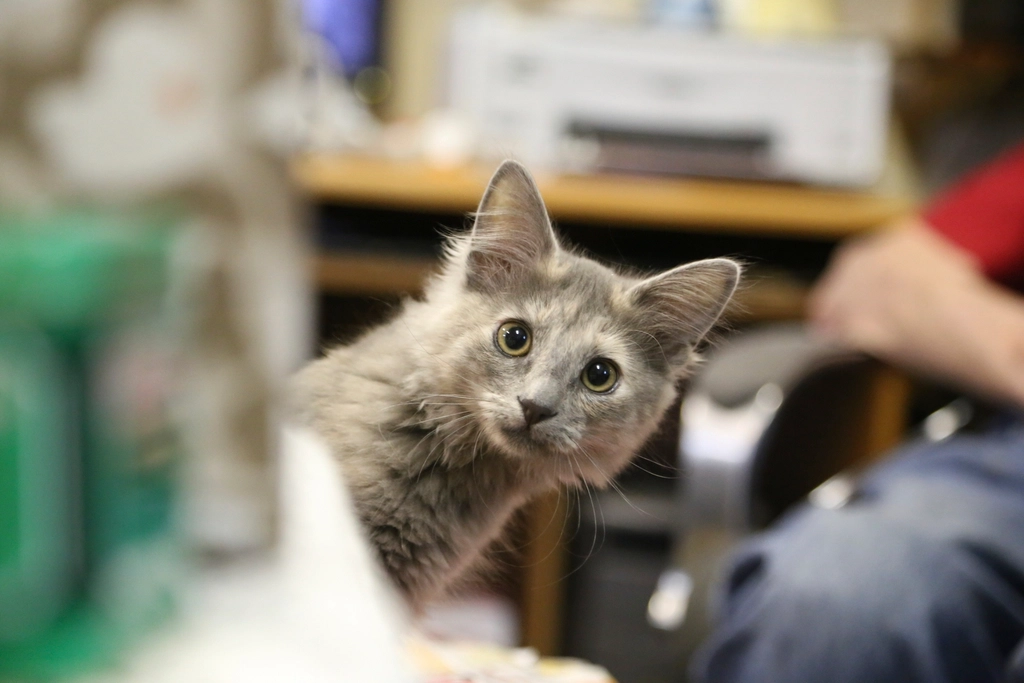Have you ever locked eyes with your cat while you’re munching on your dinner, only to find them staring right back—unblinking, curious, and maybe a little bit judgmental? It’s a moment that can feel funny, mysterious, or even slightly unsettling. You might wonder, “Are they plotting to steal my chicken?” or “Do they want a bite?” The truth is, your cat’s gaze during mealtime is packed with meaning, emotion, and instinct. Unraveling this feline behavior unlocks a world of secrets about your companion’s mind. Let’s take a deep dive into why your cat watches you eat, every single day.
Curiosity: The Hallmark of Every Cat

Cats are naturally curious creatures. Their world is a puzzle, and every new sight, sound, or smell is a piece to be investigated. Watching you eat is like tuning in to their favorite episode of human TV—there’s drama, action, and sometimes even unexpected treats. They’re not just staring blankly; they’re absorbing every bite you take, every crinkle of a wrapper, every tantalizing aroma drifting through the air. Curiosity isn’t just a trait in cats—it’s their way of life. Think of them as furry detectives, always ready to analyze what their human is up to, especially when food is involved.
Bonding Moments: Sharing Space and Time

Mealtime can be a surprisingly intimate time for cats and their humans. When your cat sits near you and watches you eat, it’s their way of participating in your routine, almost like joining the family dinner table. Some experts even believe that cats watch us eat as a form of social bonding. They’re showing trust by being close, and they’re inviting you to share a moment together—even if you’re the only one eating. For cats, closeness equals love, and sharing space during meals is a subtle but powerful sign of affection.
Food Envy: Wishing for a Bite

Let’s face it—sometimes your cat just wants a taste. The sight and smell of your food can be irresistible to their sensitive noses. If you’re eating something especially aromatic, like roasted chicken or tuna, your cat’s longing gaze might be their way of asking for a nibble. Even if you’ve just filled their food bowl, your meal always seems more interesting. This food envy is a reminder that cats, like people, can be tempted by what they can’t have, and they’re not shy about letting you know.
Mirror Behavior: Learning from Their Human

Cats are clever—they learn by watching. When your cat observes you eating, they’re picking up on patterns and cues. Maybe they notice that you sit down at the same time every evening, or that certain sounds mean it’s time for a meal. Over time, your cat might even develop their own eating rituals by mimicking yours. This mirror behavior is a sign of intelligence and adaptability, showing just how attuned your pet is to the rhythms of your household.
Protective Instincts: Keeping an Eye Out

In the wild, cats are both predators and prey. This dual role makes them hyper-aware of their surroundings, especially during vulnerable moments like eating. When your cat watches you eat, they might be keeping watch, making sure nothing sneaks up on their beloved human. It’s a silent act of protection, a way of saying, “I’ve got your back.” This instinct can be comforting, like having a tiny, furry bodyguard whose only weapon is an intense, unwavering stare.
Begging for Attention: Not Just About Food

Sometimes, it’s not the food that draws your cat in—it’s you. Cats crave attention in all sorts of quirky ways, and watching you eat is just another strategy. They might hope you’ll pause to pet them or drop a morsel. Their watchful eyes are a silent plea for acknowledgment, a gentle reminder that they want to be part of whatever you’re doing. In a cat’s mind, there’s no wrong time for a little affection.
Understanding Body Language: The Eyes Have It

Cats communicate volumes with their eyes. A slow blink, a wide stare, or narrowed pupils all signal different moods. When your cat watches you eat, pay attention to their facial expressions. Are their ears perked? Are their tails flicking? These subtle cues can help you decipher whether they’re bored, hungry, anxious, or just plain interested. Learning to read your cat’s body language adds a layer of depth to your bond and helps you respond to their needs.
Ritual and Routine: Cats Love Consistency

Cats are creatures of habit. If you eat at the same time every day, they’ll notice—and probably join in. Watching you eat becomes part of their own daily routine, a comforting ritual that marks the passage of time. Some cats even develop a sense of anticipation, appearing right on cue when they know you’re about to sit down with your plate. Consistency is soothing for cats, and your mealtime is a predictable highlight in their day.
Social Hierarchy: Who’s in Charge?

In multi-cat homes or with other pets, watching you eat can be a way for your cat to stake out their place in the social hierarchy. They may be checking if you’ll share or monitoring what others are getting. Even as solitary animals, cats are keenly aware of social dynamics. By observing you at mealtime, they’re subtly negotiating their own role in the household. It’s like an unspoken conversation about who gets what, and when.
Food Safety: Is It Good Enough?

Cats have a keen sense of what’s safe to eat and what isn’t. Watching you eat can be a way for them to gauge the safety of certain foods. If they see you enjoying something repeatedly, they might decide it’s worth trying for themselves. On the flip side, if you react negatively to a taste or smell, your cat may steer clear. This cautious observation is a survival instinct, honed over thousands of years.
The Scent Factor: A Powerful Sense of Smell

A cat’s sense of smell is far superior to ours. When you eat, the aromas wafting through the air are almost overwhelming for your pet. Each scent tells a story—where the food came from, how it was cooked, and whether it’s worth begging for. Sometimes, your cat’s stare is their way of drinking in every detail with their nose, not just their eyes. Their olfactory curiosity turns every meal into a sensory adventure.
Hunger Pangs: Maybe It’s Time for Their Meal Too

If your cat is watching you eat with extra intensity, it could be a not-so-subtle hint that their own stomach is rumbling. Cats have an uncanny ability to remember feeding times, and seeing you with food might trigger their own hunger. They might even try to guilt-trip you with their gaze, hoping you’ll head for the cat food next. This mutual mealtime schedule can be both convenient and comical.
Seeking Comfort: You Are Their Safe Space

For some cats, simply being near you brings a sense of security. Watching you eat is less about the food and more about the comfort of your presence. If your cat gravitates toward you during meals, it’s a sign that they feel safe and content in your company. In a world full of uncertainties, you are their anchor, and your mealtime is a moment of calm in their day.
Curious Kittens: Learning the Ropes

Young cats and kittens are especially prone to watching their humans eat. They’re still figuring out the world, and your actions are their primary guide. By observing your eating habits, kittens learn what’s normal, what’s tasty, and what’s off-limits. This period of observation is crucial for their development—think of it as their personal crash course in “How to Be a Cat with Humans.”
Medical Curiosity: Sniffing Out Health Changes

Surprisingly, some cats can detect changes in your health based on how you eat. If you’re suddenly eating less, skipping meals, or acting differently at the table, your cat might become more attentive or concerned. Their heightened senses can pick up on subtle shifts before you even notice them yourself. This medical curiosity is just one more way cats look out for their humans, even if it’s in their own mysterious way.
Entertainment Value: You’re the Main Show

Let’s be honest—sometimes you’re just plain fun to watch. The way you juggle your fork, the funny faces you make when you taste something spicy, or the accidental spills and crumbs—all of it is prime entertainment for your cat. Mealtime can be a front-row seat to the best show in the house, starring you. Your cat’s silent presence is their way of applauding every bite and every blunder.
Anticipating Treats: Hoping for the Best

Many cats have learned that watching you eat can pay off. Maybe you’ve slipped them a piece of chicken before, or maybe Grandma is notorious for sharing her sandwich crusts. Cats are masters of positive reinforcement—they remember what works. By watching you intently, they’re hoping you’ll repeat a past kindness. It’s optimism in its purest, fluffiest form.
Unspoken Communication: Building Your Unique Bond

Every cat-human relationship is different, and the way your cat watches you eat is part of your unique language together. Maybe it’s a game of staring contests, or maybe it’s a quiet moment of connection after a long day. However it plays out, these small rituals strengthen your bond and deepen your understanding of each other. The meaning behind your cat’s gaze might be complex, but at its heart, it speaks of love, curiosity, and the joy of simply being together.

Linnea is a born and bred Swede but spends as much time as possible in Cape Town, South Africa. This is mainly due to Cape Town’s extraordinary scenery, wildlife, and atmosphere (in other words, because Cape Town is heaven on earth.) That being said, Sweden’s majestic forests forever hold a special place in her heart. Linnea spends as much time as she can close to the ocean collecting sea shells or in the park admiring puppies.




